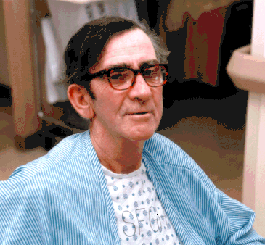



In March, 1997, James Brennan, a retired seaman, and a volunteer at the Trauma Foundation, was standing on the corner of a busy San Francisco street. His next memory is of lying in the gutter, severely injured. James, and another person standing nearby, were the victims of a red-
light runner.
James' lower leg was crushed, his pelvis and shoulder were broken, but he survived. The other pedestrian did not. Several months and several operations later, and still facing extensive physical therapy, James is finally back home.
The incident provoked a groundswell of protest and outrage in San Francisco, where red-light running is epidemic. Public attention immediately focused on the extent of the problem, and what can be done. The media were very interested in what this survivor had to say. In his interviews with them following his hospitalization, James became an injury prevention advocate, providing insight and valuable ideas towards solutions for the red-light running problem. To quote from an Op Ed in the May 13, 1997 San Francisco Examiner:
"Now I am determined to do what I can to stop people from running red lights, to stop people who could kill other people. Sometimes I'm pessimistic, because people run lights all the time. But the folks at the Trauma Foundation tell me there are several places to start. First, enforcement. I think red-light running should be prosecuted as a crime. If you shoot a gun at someone and miss, they still press criminal charges. If you run a red light and don't happen to hit someone, it should still be a crime. The fines should be high, but that's not enough. Maybe if you're caught running a red light more than once, you should lose your license, as with drunk driving. There are engineering solutions that would help. Make the stop lights and street signs bigger. Take the clutter away. And we need more education. You can make all the laws in the world, but it all comes down to the people behind the wheel. And too many pedestrians ignore lights because they think they can run to the other side before the next wave of traffic comes.
The City's Emergency Medical Services division is asking people to send me pledge cards promising that they won't run red lights. Maybe that will remind people to stop using city streets as highways. When I finish my rehab, I'm going back to the Trauma Foundation to work on stopping red-light running. I hope that people who hear about my story will be more aware of the yellow light when they drive and when they walk. Please do me a favor. When you're in your car, slow down at the yellow and stop at the red. Let's stop killing people."
5/97